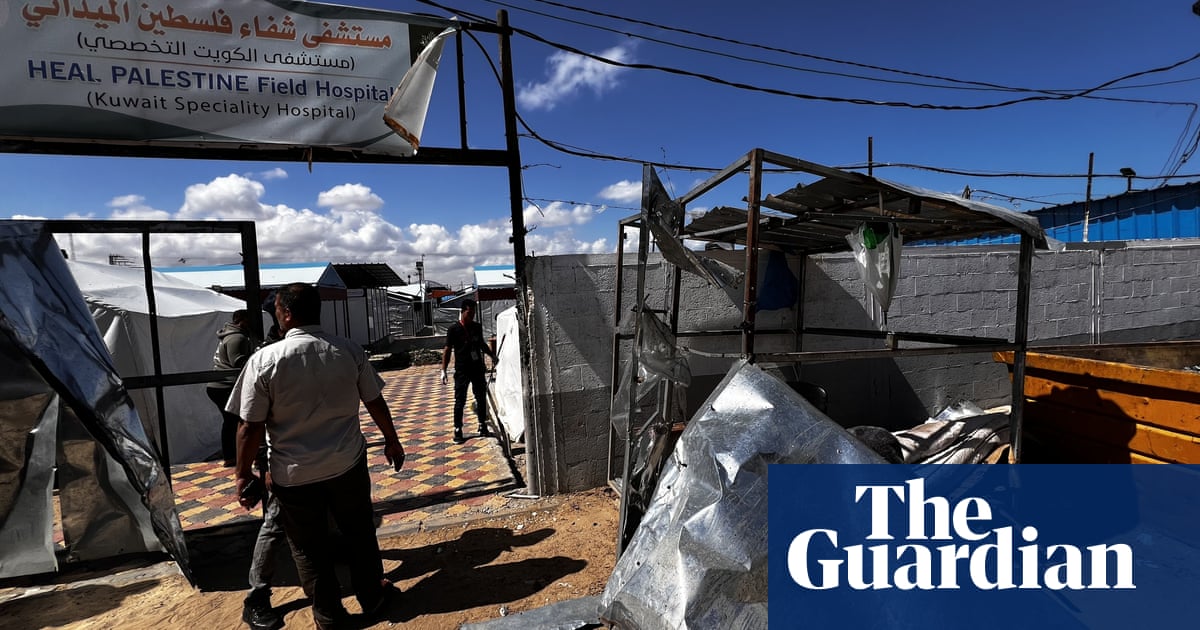Gaza’s Humanitarian Crisis Deepens Amidst Hospital Strikes and Aid Blockade
Published: April 17, 2025
Khan Younis, Gaza Strip – The humanitarian crisis in Gaza continues to escalate, marked by recent Israeli missile strikes on hospitals and a prolonged blockade of essential aid, pushing the region to what the UN describes as its worst state in 18 months. These developments raise serious concerns about violations of international humanitarian law and the increasing suffering of the Palestinian population.
Medic Killed in Kuwaiti Field Hospital Strike
On Tuesday, a missile strike hit the entrance of the Kuwaiti field hospital in al-Muwasi, near Khan Younis, resulting in the death of a medic and injuries to nine others, according to medical staff on the ground. This attack compounds the already dire situation for hundreds of thousands of displaced Palestinians sheltering in the area. These individuals, largely residing in makeshift tents amidst sand dunes, were forced from their homes by ongoing Israeli military operations that have seized significant portions of southern Gaza, including Rafah city.
Al-Ahli Hospital Partially Destroyed
This incident follows a similar strike on Sunday where an Israeli missile partially destroyed al-Ahli hospital in Gaza City. The hospital, which was the last facility providing critical care in northern Gaza, is now barely operational and unable to accept new patients, according to doctors. António Guterres, the UN secretary general, expressed his deep alarm, emphasizing that hospitals are protected under international humanitarian law.
“Deeply alarmed”
António Guterres, UN Secretary General
Allegations of Hamas Activity and Targeted Strikes
The Israeli military has repeatedly targeted hospitals in Gaza over the past 18 months, claiming that Hamas uses these facilities to conceal terrorist activities. In the case of al-Ahli hospital,Israeli forces alleged it was being used as a “command and control” center by Hamas,a claim the group denies. Paramedics carrying out rescue operations in Gaza have also reportedly been targeted,further hindering the provision of medical assistance.
Healthcare System on the Brink of Collapse
Doctors working in Gaza warn that the provision of medical care is at a breaking point. Dr. Moataz Harara,head of the emergency department at al-ahli,stated:
“The repeated targeting of the healthcare system has instilled fear and shaken the confidence of medical teams,especially after seeing the torture,abuse,and continuous targeting they endure. Enough is enough.”
Dr. Moataz Harara, Head of Emergency Department at al-Ahli
The situation is exacerbated by critical shortages of essential supplies, including medicine, further straining the healthcare system’s ability to cope with the overwhelming needs of the population.
Aid Blockade and its Impact
Since the collapse of the ceasefire with Hamas in March, Israel has blocked all aid to the territory, leading to critical shortages of food, water, fuel, and medicine. This marks the longest period Israel has denied aid to Gaza. Human rights groups contend that this tactic, intended to pressure Hamas into releasing the remaining hostages, amounts to a war crime under international law. The UN office for the coordination of humanitarian affairs describes the situation in Gaza as:
“Likely the worst it has been in the 18 months since the outbreak of hostilities”.
UN Office for the Coordination of Humanitarian Affairs
The blockade not only deprives civilians of essential resources but also severely impedes the ability of humanitarian organizations to provide assistance.
Escalation of Violence and Displacement
In addition to the aid blockade,Israel has resumed airstrikes and ground operations in Gaza,displacing approximately 400,000 people and leading to a surge in civilian casualties.Since March alone, 1,600 Palestinians have been killed.
Israeli Viewpoint and strategy
Speaking to Yedioth Ahronoth, an Israeli newspaper, an unnamed security official claimed the military pressure was working and would force Hamas to agree to a deal on the hostages.the official stated:
“the military pressure is having an impact. They have a shortage of gas and the food and the fuel will run out in a few weeks. The big achievement of the residents’ return to the northern gaza Strip has been erased. That’s rattled them.”
Unnamed Israeli Security Official
Casualty Figures and UN Concerns
The Israeli offensive, initiated in response to the attacks by Hamas on southern Israel on October 7, 2023, has now resulted in 51,000 lives. While the Gaza health ministry’s count does not differentiate between civilians and combatants, women and children make up more than half of the dead.
Earlier this month, a group of UN experts stated that Israel’s actions in Gaza were leading to the:
“Destruction of Palestinian life. If they are not killed by bombs or bullets, they slowly suffocate for lack of basic means of survival.the only difference is the means and speed of death.”
UN Experts
Rising Concerns in the U.S. and International Community
The recent events in Gaza have sparked growing concern within the U.S. and the international community. Several U.S.lawmakers have expressed reservations about the scale of civilian casualties and the impact of the aid blockade, calling for a reevaluation of U.S.policy toward the conflict. Advocacy groups are organizing protests across the U.S.,urging the Biden management to take a stronger stance in demanding an end to the violence and ensuring humanitarian access to Gaza. The situation is evocative of past instances where U.S. foreign policy has come under scrutiny for its impact on civilian populations in conflict zones.
The international community is also stepping up its efforts to address the crisis,with the UN Security Council scheduled to hold an emergency session to discuss the situation. several countries are considering increasing humanitarian aid to Gaza, while others are exploring diplomatic initiatives to revive ceasefire negotiations.
Potential Legal Ramifications and Investigations
The alleged targeting of hospitals and medical personnel, along with the imposition of a thorough aid blockade, raises serious questions regarding potential violations of international humanitarian law. These actions could possibly be investigated by international bodies such as the International Criminal Court (ICC). The principle of distinction, which requires parties to a conflict to distinguish between military objectives and civilian objects, including hospitals, is a cornerstone of international humanitarian law. Attacks intentionally directed against hospitals or medical personnel constitute war crimes under the Rome Statute of the ICC,unless there is evidence that the facilities were being used for military purposes by the opposing party. The burden of proof lies with the party making such an allegation to demonstrate the loss of protected status.
What are the most critical steps needed to address the long-term needs of the people in Gaza?
Interview: Escalating Crisis in Gaza – A Conversation with Dr. Aisha Rahman
Published: April 18, 2025
Archyde News Editor interviews Dr. Aisha Rahman, a humanitarian aid coordinator with extensive experience in conflict zones, to discuss the deepening humanitarian crisis in Gaza.
Interview with Dr. Aisha Rahman
Archyde News Editor: Dr.Rahman, thank you for joining us. The situation in Gaza, as we understand, has become incredibly dire. Can you paint a picture of the current humanitarian conditions on the ground?
Dr. Aisha Rahman: Thank you for having me.The situation is truly catastrophic. Hospitals are being targeted, and essential aid is being blocked. People are facing severe shortages of food, water, and medicine. The healthcare system is near collapse, and the sheer scale of displacement is overwhelming.
Archyde News Editor: The article highlights the targeting of hospitals.From a humanitarian perspective,what are the immediate consequences of these attacks?
Dr. Aisha Rahman:The attacks are devastating.They not only cause casualties among medical staff and patients but also cripple the ability to provide any care. They also instill fear, preventing people from seeking medical attention even when needed. It’s a direct violation of international law and a major obstacle to providing aid.
Archyde News Editor: The report details an almost complete aid blockade. What impact is this having on the civilian population, particularly concerning the most vulnerable demographics?
Dr.Aisha Rahman: The aid blockade is pushing the population to the brink of survival. Children and the elderly are suffering the most. They lack access to food, proper healthcare, and clean water. Many children are displaying acute malnutrition symptoms. The blockade is not just a humanitarian issue; it exacerbates the physical and psychological health of the people, which will have long-term consequences.
Archyde News Editor: The article mentions allegations of Hamas activity within hospitals. If such activity is confirmed, how does international law address the protection of healthcare facilities in a conflict zone?
Dr. Aisha Rahman: International Humanitarian Law (IHL) is very clear. Hospitals and medical personnel are protected. However, if a hospital is being used for military purposes, it can become a valid target. The attacking party must provide warnings and take precautions to minimize civilian casualties, which, from my perspective, is not happening in Gaza.
Archyde News Editor: The report notes rising concerns in the international community. What specific actions do you believe are urgently needed to alleviate the suffering in Gaza?
Dr. Aisha Rahman: First and foremost, a complete and immediate cessation of hostilities is necessary for civilians to receive the necessary aid. There needs to be unfettered access for humanitarian organizations to provide assistance. Also, essential supplies must be allowed to enter Gaza, and the targeting of hospitals and medical personnel must stop instantly with accountability for the perpetrators. Anything short of this is not acceptable.
Archyde News Editor: What challenges are humanitarian organizations facing in delivering aid currently considering safety, bureaucracy, and the political complexities?
Dr. Aisha Rahman: the delivery of the aid is incredibly challenging. The lack of safety and security for aid workers,bureaucratic hurdles in getting aid into Gaza,and the political sensitivities of the situation all present major obstacles. There is a very unsafe working environment where aid workers have lost their lives while trying to assist others, highlighting the severity of the situation.
Archyde News Editor: With a potential for legal implications to be investigated, how important is ensuring the protection of medical staff and medical facilities to prevent future atrocities?
Dr. Aisha Rahman: It is of utmost importance. Protecting the healthcare system and the medical staff is fundamental. It is critical for any response to the conflict. Without a safe, functioning healthcare system, and with medical staff being unable to perform their duties safely, there will be no other way to stop this atrocity.
archyde News Editor: Looking ahead, what are the most critical steps needed to address the long-term needs of the people in Gaza.
Dr. Aisha Rahman: Besides an immediate ceasefire and access to humanitarian aid, there has to be a long-term strategy to rebuild houses, repair schools, and address the trauma that all Palestinians have suffered. There has to be justice, too, and the international community must act swiftly to bring an end to the occupation with a focus on finding a long-term solution to the conflict for lasting peace.
Archyde News Editor: what message would you like to convey to the international community regarding the situation in Gaza?
dr. Aisha Rahman: The world must not be silent.The suffering in Gaza is immense. We must demand an end to the violence,the blockade,and the violations of human rights. We need increased humanitarian aid, and we need a commitment to justice and lasting peace for the Palestinian people.






